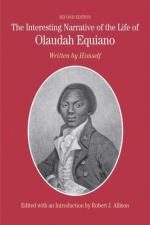at length by the empire of Abyssinia, near 1500 miles
from its beginning. This kingdom is divided into
many provinces or districts: in one of the most
remote and fertile of which, called Eboe, I was born,
in the year 1745, in a charming fruitful vale, named
Essaka. The distance of this province from the
capital of Benin and the sea coast must be very considerable;
for I had never heard of white men or Europeans, nor
of the sea: and our subjection to the king of
Benin was little more than nominal; for every transaction
of the government, as far as my slender observation
extended, was conducted by the chiefs or elders of
the place. The manners and government of a people
who have little commerce with other countries are generally
very simple; and the history of what passes in one
family or village may serve as a specimen of a nation.
My father was one of those elders or chiefs I have
spoken of, and was styled Embrenche; a term, as I
remember, importing the highest distinction, and signifying
in our language a mark of grandeur. This
mark is conferred on the person entitled to it, by
cutting the skin across at the top of the forehead,
and drawing it down to the eye-brows; and while it
is in this situation applying a warm hand, and rubbing
it until it shrinks up into a thick weal across
the lower part of the forehead. Most of the judges
and senators were thus marked; my father had long born
it: I had seen it conferred on one of my brothers,
and I was also destined to receive it by my
parents. Those Embrence, or chief men, decided
disputes and punished crimes; for which purpose they
always assembled together. The proceedings were
generally short; and in most cases the law of retaliation
prevailed. I remember a man was brought before
my father, and the other judges, for kidnapping a boy;
and, although he was the son of a chief or senator,
he was condemned to make recompense by a man or woman
slave. Adultery, however, was sometimes punished
with slavery or death; a punishment which I believe
is inflicted on it throughout most of the nations of
Africa[A]: so sacred among them is the honour
of the marriage bed, and so jealous are they of the
fidelity of their wives. Of this I recollect an
instance:—a woman was convicted before the
judges of adultery, and delivered over, as the custom
was, to her husband to be punished. Accordingly
he determined to put her to death: but it being
found, just before her execution, that she had an
infant at her breast; and no woman being prevailed
on to perform the part of a nurse, she was spared
on account of the child. The men, however, do
not preserve the same constancy to their wives, which
they expect from them; for they indulge in a plurality,
though seldom in more than two. Their mode of
marriage is thus:—both parties are usually
betrothed when young by their parents, (though I have
known the males to betroth themselves). On this
occasion a feast is prepared, and the bride and bridegroom




